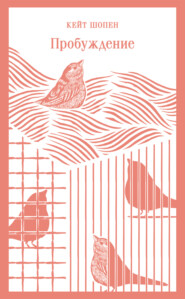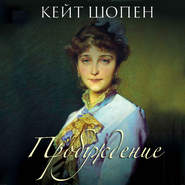По всем вопросам обращайтесь на: info@litportal.ru
(©) 2003-2025.
✖
The Awakening
Настройки чтения
Размер шрифта
Высота строк
Поля
CHAPTER 4 (#ulink_ee946943-f029-515d-8790-2748799e62f5)
It would have been a difficult matter for Mr. Pontellier to define to his own satisfaction or any one else’s wherein his wife failed in her duty toward their children. It was something which he felt rather than perceived, and he never voiced the feeling without subsequent regret and ample atonement.
If one of the little Pontellier boys took a tumble whilst at play, he was not apt to rush crying to his mother’s arms for comfort; he would more likely pick himself up, wipe the water out of his eyes and the sand out of his mouth, and go on playing. Tots as they were, they pulled together and stood their ground in childish battles with doubled fists and uplifted voices, which usually prevailed against the other mother-tots. The quadroon nurse was looked upon as a huge encumbrance, only good to button up waists and panties and to brush and part hair; since it seemed to be a law of society that hair must be parted and brushed.
In short, Mrs. Pontellier was not a mother-woman. The mother-women seemed to prevail that summer at Grand Isle. It was easy to know them, fluttering about with extended, protecting wings when any harm, real or imaginary, threatened their precious brood. They were women who idolized their children, worshiped their husbands, and esteemed it a holy privilege to efface themselves as individuals and grow wings as ministering angels.
Many of them were delicious in the rôle; one of them was the embodiment of every womanly grace and charm. If her husband did not adore her, he was a brute, deserving of death by slow torture. Her name was Adèle Ratignolle. There are no words to describe her save the old ones that have served so often to picture the bygone heroine of romance and the fair lady of our dreams. There was nothing subtle or hidden about her charms; her beauty was all there, flaming and apparent: the spun-gold hair that comb nor confining pin could restrain; the blue eyes that were like nothing but sapphires; two lips that pouted, that were so red one could only think of cherries or some other delicious crimson fruit in looking at them. She was growing a little stout, but it did not seem to detract an iota from the grace of every step, pose, gesture. One would not have wanted her white neck a mite less full or her beautiful arms more slender. Never were hands more exquisite than hers, and it was a joy to look at them when she threaded her needle or adjusted her gold thimble to her taper middle finger as she sewed away on the little night-drawers or fashioned a bodice or a bib.
Madame Ratignolle was very fond of Mrs. Pontellier, and often she took her sewing and went over to sit with her in the afternoons. She was sitting there the afternoon of the day the box arrived from New Orleans. She had possession of the rocker, and she was busily engaged in sewing upon a diminutive pair of night drawers.
She had brought the pattern of the drawers for Mrs. Pontellier to cut out—a marvel of construction, fashioned to enclose a baby’s body so effectually that only two small eyes might look out from the garment, like an Eskimo’s. They were designed for winter wear, when treacherous drafts came down chimneys and insidious currents of deadly cold found their way through keyholes.
Mrs. Pontellier’s mind was quite at rest concerning the present material needs of her children, and she could not see the use of anticipating and making winter night garments the subject of her summer meditations. But she did not want to appear unamiable and uninterested, so she had brought forth newspapers, which she spread upon the floor of the gallery, and under Madame Ratignolle’s directions she had cut a pattern of the impervious garment.
Robert was there, seated as he had been the Sunday before, and Mrs. Pontellier also occupied her former position on the upper step, leaning listlessly against the post. Beside her was a box of bonbons, which she held out at intervals to Madame Ratignolle.
That lady seemed at a loss to make a selection, but finally settled upon a stick of nougat, wondering if it were not too rich; whether it could possibly hurt her. Madame Ratignolle had been married seven years. About every two years she had a baby. At that time she had three babies, and was beginning to think of a fourth one. She was always talking about her “condition.” Her “condition” was in no way apparent, and no one would have known a thing about it but for her persistence in making it the subject of conversation.
Robert started to reassure her, asserting that he had known a lady who had subsisted upon nougat during the entire—but seeing the color mount into Mrs. Pontellier’s face he checked himself and changed the subject.
Mrs. Pontellier, though she had married a Creole, was not thoroughly at home in the society of Creoles; never before had she been thrown so intimately among them. There were only Creoles that summer at Lebrun’s. They all knew each other, and felt like one large family, among whom existed the most amicable relations. A characteristic which distinguished them and which impressed Mrs. Pontellier most forcibly was their entire absence of prudery. Their freedom of expression was at first incomprehensible to her, though she had no difficulty in reconciling it with a lofty chastity which in the Creole woman seems to be inborn and unmistakable.
Never would Edna Pontellier forget the shock with which she heard Madame Ratignolle relating to old Monsieur Farival the harrowing story of one of her accouchements, withholding no intimate detail. She was growing accustomed to like shocks, but she could not keep the mounting color back from her cheeks. Oftener than once her coming had interrupted the droll story with which Robert was entertaining some amused group of married women.
A book had gone the rounds of the pension. When it came her turn to read it, she did so with profound astonishment. She felt moved to read the book in secret and solitude, though none of the others had done so—to hide it from view at the sound of approaching footsteps. It was openly criticised and freely discussed at table. Mrs. Pontellier gave over being astonished, and concluded that wonders would never cease.
CHAPTER 5 (#ulink_6349e94f-7052-551e-ae05-b76253dff228)
They formed a congenial group sitting there that summer afternoon—Madame Ratignolle sewing away, often stopping to relate a story or incident with much expressive gesture of her perfect hands; Robert and Mrs. Pontellier sitting idle, exchanging occasional words, glances or smiles which indicated a certain advanced stage of intimacy and camaraderie.
He had lived in her shadow during the past month. No one thought anything of it. Many had predicted that Robert would devote himself to Mrs. Pontellier when he arrived. Since the age of fifteen, which was eleven years before, Robert each summer at Grand Isle had constituted himself the devoted attendant of some fair dame or damsel. Sometimes it was a young girl, again a widow; but as often as not it was some interesting married woman.
For two consecutive seasons he lived in the sunlight of Mademoiselle Duvigné’s presence. But she died between summers; then Robert posed as an inconsolable, prostrating himself at the feet of Madame Ratignolle for whatever crumbs of sympathy and comfort she might be pleased to vouchsafe.
Mrs. Pontellier liked to sit and gaze at her fair companion as she might look upon a faultless Madonna.
“Could any one fathom the cruelty beneath that fair exterior?” murmured Robert. “She knew that I adored her once, and she let me adore her. It was ‘Robert, come; go; stand up; sit down; do this; do that; see if the baby sleeps; my thimble, please, that I left God knows where. Come and read Daudet to me while I sew.”’
“Par exemple! I never had to ask. You were always there under my feet, like a troublesome cat.”
“You mean like an adoring dog. And just as soon as Ratignolle appeared on the scene, then it was like a dog. ‘Passez! Adieu! Allez vous-en!”’
“Perhaps I feared to make Alphonse jealous,” she inter-joined, with excessive naïveté. That made them all laugh. The right hand jealous of the left! The heart jealous of the soul! But for that matter, the Creole husband is never jealous; with him the gangrene passion is one which has become dwarfed by disuse.
Meanwhile Robert, addressing Mrs. Pontellier, continued to tell of his one time hopeless passion for Madame Ratignolle; of sleepless nights, of consuming flames till the very sea sizzled when he took his daily plunge. While the lady at the needle kept up a little running, contemptuous comment:
“Blagueur—farceur—gros bête, va!”
He never assumed this serio-comic tone when alone with Mrs. Pontellier. She never knew precisely what to make of it; at that moment it was impossible for her to guess how much of it was jest and what proportion was earnest. It was understood that he had often spoken words of love to Madame Ratignolle, without any thought of being taken seriously. Mrs. Pontellier was glad he had not assumed a similar rôle toward herself. It would have been unacceptable and annoying.
Mrs. Pontellier had brought her sketching materials, which she sometimes dabbled with in an unprofessional way. She liked the dabbling. She felt in it satisfaction of a kind which no other employment afforded her.
She had long wished to try herself on Madame Ratignolle. Never had that lady seemed a more tempting subject than at that moment, seated there like some sensuous Madonna, with the gleam of the fading day enriching her splendid color.
Robert crossed over and seated himself upon the step below Mrs. Pontellier, that he might watch her work. She handled her brushes with a certain ease and freedom which came, not from long and close acquaintance with them, but from a natural aptitude. Robert followed her work with close attention, giving forth little ejaculatory expressions of appreciation in French, which he addressed to Madame Ratignolle.
“Mais ce n’est pas mal! Elle s’y connait, elle a de la force, oui.”
During his oblivious attention he once quietly rested his head against Mrs. Pontellier’s arm. As gently she repulsed him. Once again he repeated the offense. She could not but believe it to be thoughtlessness on his part, yet that was no reason she should submit to it. She did not remonstrate, except again to repulse him quietly but firmly. He offered no apology.
The picture completed bore no resemblance to Madame Ratignolle. She was greatly disappointed to find that it did not look like her. But it was a fair enough piece of work, and in many respects satisfying.
Mrs. Pontellier evidently did not think so. After surveying the sketch critically she drew a broad smudge of paint across its surface, and crumpled the paper between her hands.
The youngsters came tumbling up the steps, the quadroon following at the respectful distance which they required her to observe. Mrs. Pontellier made them carry her paints and things into the house. She sought to detain them for a little talk and some pleasantry. But they were greatly in earnest. They had only come to investigate the contents of the bonbon box. They accepted without murmuring what she chose to give them, each holding out two chubby hands scoop-like, in the vain hope that they might be filled; and then away they went.
The sun was low in the west, and the breeze soft and languorous that came up from the south, charged with the seductive odor of the sea. Children, freshly befurbelowed, were gathering for their games under the oaks. Their voices were high and penetrating.
Madame Ratignolle folded her sewing, placing thimble, scissors and thread all neatly together in the roll, which she pinned securely. She complained of faintness. Mrs. Pontellier flew for the cologne water and a fan. She bathed Madame Ratignolle’s face with cologne, while Robert plied the fan with unnecessary vigor.
The spell was soon over, and Mrs. Pontellier could not help wondering if there were not a little imagination responsible for its origin, for the rose tint had never faded from her friend’s face.
She stood watching the fair woman walk down the long line of galleries with the grace and majesty which queens are sometimes supposed to possess. Her little ones ran to meet her. Two of them clung about her white skirts, the third she took from its nurse and with a thousand endearments bore it along in her own fond, encircling arms. Though, as everybody well knew, the doctor had forbidden her to lift so much as a pin!
“Are you going bathing?” asked Robert of Mrs. Pontellier. It was not so much a question as a reminder.
“Oh, no,” she answered, with a tone of indecision. “I’m tired; I think not.” Her glance wandered from his face away toward the Gulf, whose sonorous murmur reached her like a loving but imperative entreaty.
“Oh, come!” he insisted. “You mustn’t miss your bath. Come on. The water must be delicious; it will not hurt you. Come.”
He reached up for her big, rough straw hat that hung on a peg outside the door, and put it on her head. They descended the steps, and walked away together toward the beach. The sun was low in the west and the breeze was soft and warm.
CHAPTER 6 (#ulink_271a4ae1-e4bc-5bb4-8026-54a51a871bd3)
Edna Pontellier could not have told why, wishing to go to the beach with Robert, she should in the first place have declined, and in the second place have followed in obedience to one of the two contradictory impulses which impelled her.
A certain light was beginning to dawn dimly within her—the light which, showing the way, forbids it.
At that early period it served but to bewilder her. It moved her to dreams, to thoughtfulness, to the shadowy anguish which had overcome her the midnight when she had abandoned herself to tears.
In short, Mrs. Pontellier was beginning to realize her position in the universe as a human being, and to recognize her relations as an individual to the world within and about her. This may seem like a ponderous weight of wisdom to descend upon the soul of a young woman of twenty-eight—perhaps more wisdom than the Holy Ghost is usually pleased to vouchsafe to any woman.
But the beginning of things, of a world especially, is necessarily vague, tangled, chaotic, and exceedingly disturbing. How few of us ever emerge from such beginning! How many souls perish in its tumult!
The voice of the sea is seductive; never ceasing, whispering, clamoring, murmuring, inviting the soul to wander for a spell in abysses of solitude; to lose itself in mazes of inward contemplation.
The voice of the sea speaks to the soul. The touch of the sea is sensuous, enfolding the body in its soft, close embrace.









